|
|
|
Sort Order |
|
|
|
Items / Page
|
|
|
|
|
|
|
| Srl | Item |
| 1 |
ID:
160638
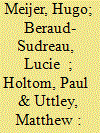

|
|
|
|
|
| Summary/Abstract |
The rise of China has been fuelled by a massive military modernisation programme relying, in large part, on the acquisition of foreign military equipment. The question of how the world’s major powers define their arms transfer policies towards China is therefore crucially important. This article makes two original contributions. First, drawing on neoclassical realism, it proposes an explanatory framework integrating international and domestic factors to explain variations in major powers’ arms transfers. Second, based on a large body of elite interviews and diplomatic cables, it offers the first comprehensive comparison of American, British, French and Russian arms transfer policies towards China since the end of the Cold War.
|
|
|
|
|
|
|
|
|
|
|
|
|
|
|
|
| 2 |
ID:
169803
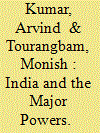

|
|
|
|
|
| Summary/Abstract |
The changing dynamics of geopolitics has led India to recalibrate its relationship with the major powers – such as the United States, Japan, China and Russia in the twenty first century. The political dynamics of these nations in particular are such where the convergences among major powers vis-à-vis India become a major part of discourse. India’s engagement with major powers in the twenty first century has been largely based on the principles of building win-win situation by emphasising and strengthening its economic diplomacy.
|
|
|
|
|
|
|
|
|
|
|
|
|
|
|
|
| 3 |
ID:
072696
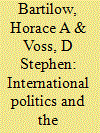

|
|
|
|
|
| Publication |
2006.
|
| Summary/Abstract |
Previous research indicates that a country's international commerce usually tracks the pattern of its diplomatic entanglements. As the evidence for this observation comes from overall trade statistics, however, analysts have had little ability to probe the sources of the linkage. This study uses major-power trade data from 1962 to 1997, disaggregated by economic sector, within an elaborated 'gravity model' that parses out some of the potential causal paths. Our results indicate that, while (1) commercial exchanges among major powers did 'follow the flag' (2) within all sectors during the period under study, not only those with immediately military value, (3) national traits that are causally prior to foreign relations, but often excluded from studies of international trade, also predicted trade in each sector, and (4) the major-power democracies did not show any particular favoritism to each other after these national differences in trade activity are considered.
|
|
|
|
|
|
|
|
|
|
|
|
|
|
|
|
| 4 |
ID:
069840
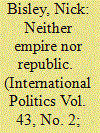

|
|
|
| 5 |
ID:
139505
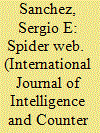

|
|
|
|
|
| Summary/Abstract |
Some U.S. counterintelligence officials fear that terrorist groups such as al-Qaeda may employ some of the same tactics, techniques, and procedures (TTPs) of intelligence collection as its state adversaries. Indeed, according to Justin R. Harber, “al-Qaeda training media include lessons on how to collect open source intelligence, conduct surveillance, interrogate detainees, and recruit agents working in a foreign government. Moreover, others argue that al-Qaeda—“… the most backward, barbaric, bloodthirsty, and oppressive terrorist group on earth”—is under-resourced, given the United States's “… massive, sprawling, multi-billion-dollar intelligence gathering bureaucracy.
|
|
|
|
|
|
|
|
|
|
|
|
|
|
|
|
| 6 |
ID:
182671
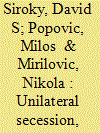

|
|
|
|
|
| Summary/Abstract |
Recognition of aspiring states from established countries is central to becoming a member state of the international system. Previous research suggests that great power recognition decisions regarding aspiring states rapidly converge toward either recognition or non-recognition, yet great power convergence has still not occurred in the case of Kosovo after more than ten years. Unilateral secessions typically remain wholly unrecognized, since they violate the norm of home state consent, yet Kosovo has now been recognized by more than 100 countries. Why do some countries extend recognition to unilateral secessions, and do so early, whereas others delay recognition or withhold it altogether? In the case of Kosovo, great power influence and contestation, rather than convergence, have played a key role in shaping recognition decisions. We argue that countries in the US sphere of influence, with strong economic and military ties, are more likely to recognize Kosovo and to do so relatively fast, whereas countries influenced by Russia are less likely to recognize Kosovo at all, or to do so only after an extended delay. However, great powers are not equal in influencing other states to adopt their preferred position, since the USA is more powerful than Russia and can benefit from working alongside allies within the Western-oriented world order. We estimate a non-proportional Cox model with new time-varying data on Kosovo recognition and provide evidence that US military ties influenced other countries in extending recognition to unilateral secession.
|
|
|
|
|
|
|
|
|
|
|
|
|
|
|
|
|
|
|
|
|